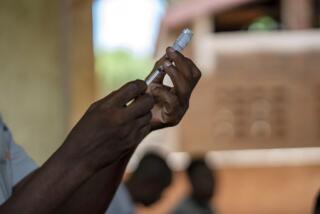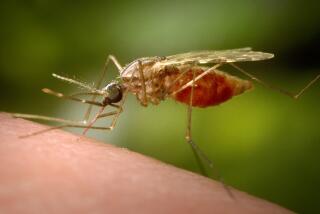No safety concerns raised in Ebola vaccine trial, researchers say
- Share via
Initial human testing of a top Ebola vaccine candidate demonstrated that the drug was safe and provoked a strong immune response, according to researchers.
In a paper published in the New England Journal of Medicine, researchers at the National Institute of Allergy and Infectious Diseases described the effects of the so-called NIAID/GSK investigational Ebola vaccine on 20 adults at the NIAID’s Vaccine Research Center.
“In this small study, no safety concerns were identified; however, transient fever developed within one day after vaccination in two participants,” wrote study co-author Nancy Sullivan, chief of the VRC’s biodefense research section, and colleagues.
The vaccine, which uses a weakened and genetically modified chimpanzee cold virus, is one of several that are now under accelerated development in response to the Ebola epidemic in West Africa. To date, the outbreak has killed more than 5,600 people, and sickened more than 15,900, according to the World Health Organization.
The trial participants -- nine men and 11 women -- were split into two groups, with one group receiving a stronger dose of vaccine. Researchers said that the stronger dosage provoked a larger immune system response, but also caused the temporary fever in two subjects.
The same vaccine was shown to be effective in monkeys, but the exact dosage that would be appropriate for humans remains unclear. In animal tests, the monkeys were given the vaccine and then infected with large amounts of the Ebola virus -- something that would be unethical to do with human subjects. Researchers say that cases of human infection probably involve smaller quantities of the virus.
“Although the results of the trial are indeed promising, questions remain,” wrote Dr. Daniel Bausch, an epidemiologist at Tulane University, who was not involved in the research but who penned an accompanying journal editorial.
“There were no major adverse effects, but the sample size (10 persons at each dose level) is too small to draw firm conclusions in this regard ... Getting the dose right has relevance not only for ensuring individual protection and minimizing adverse effects, but also for stretching the vaccine supply to the maximum number of doses possible to combat the ongoing outbreak,” Bausch wrote.
The NIAID/GSK vaccine was formulated to fight two strains of Ebola: Zaire and Sudan. The current outbreak involves the Zaire strain of the virus.
A different version of the vaccine, which would focus only on the Zaire strain, began human testing in October, according to the NIAID. Results of those studies should be available by the end of the year.
Follow @montemorin for science news







